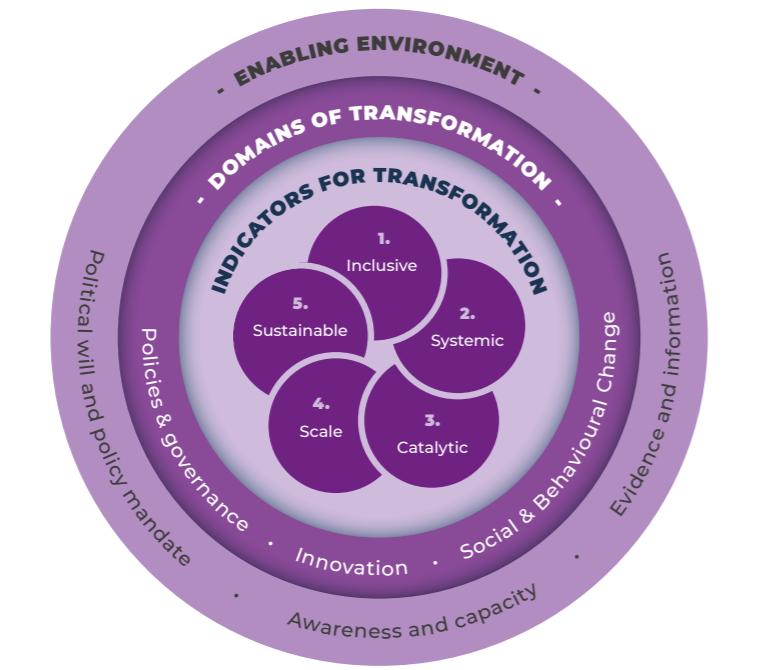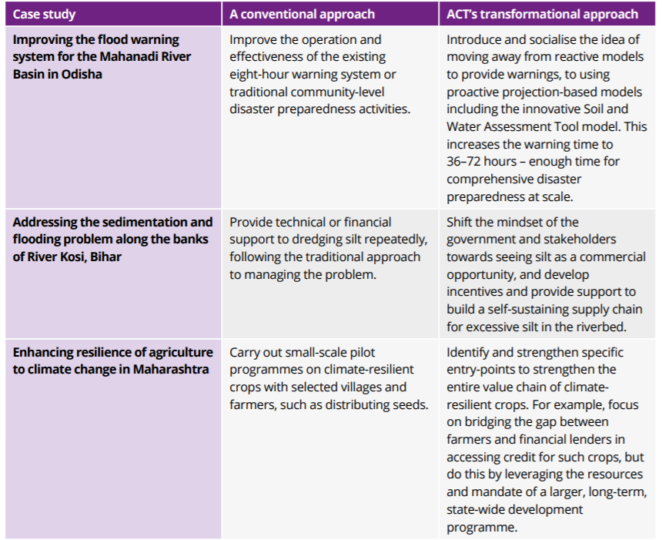Unpacking Transformation: A framework and insights from adaptation mainstreaming

Introduction
The increasing scale and severity of the impacts of climate change pose a fundamental challenge to development and economic growth. The scale and urgency of action required to limit global warming and help systems rapidly adapt to the impacts of climate change have led to a growing discourse on the need for transformational changes within social, human, physical, financial and political systems. However, while there is consensus among academics and practitioners on the need to radically alter systems, there is little agreement on what constitutes transformation and how to support and measure it.
This paper* contributes to improving understanding of how funders, practitioners and other stakeholders can support and facilitate transformation in adaptation to climate change. It uses the latest academic literature, as well as learning from practice, to put forward a conceptual framework for determining the likelihood of an adaptation initiative delivering transformation.
*Download the full paper from the right-hand column.
Unpacking transformation
The conceptual framework suggested by this paper unpacks the term ‘transformation’ into three components:
- Enabling environment factors: These are the factors that should be in place to be able to achieve meaningful, lasting and fundamental change. They include political will and the policy environment, evidence and information, and awareness and capacity
- Transformational domains: These constitute areas within which transformational change takes place. They include public policy and governance, innovation, and social and behaviour change.
- Characteristics: These are indicators of transformation and therefore should be features of initiative aiming to support transformation. They include catalytic, scale, sustainable, inclusive, and systemic indicators.
Case studies
The paper then applies the framework to examples of adaptation interventions being delivered as part of the Action on Climate Today (ACT) programme. ACT, a Department for International Development-funded initiative, supports 11 national and sub-national governments in South Asia to mainstream climate change adaptation into plans, policies and interventions. The paper presents a number of case studies from ACT that explore how the intervention is attempting to support transformation, and the signs that transformation is likely. These case studies use a theory of change approach to present evidence to assess how likely an intervention is to deliver transformation.
Table 1 (below) exemplifies some of these case study applications of transformational adaptation compared to conventional approaches:

Lessons Learnt
- Characteristics of transformation should guide programme design as well as implementation.
- Prioritising transformation within one domain of activity may entail trade-offs and limit the ability to transform within another.
- Transformation should be firmly rooted in a shared understanding of what is being transformed, what results need to be achieved and who will stand to benefit.
- Adaptive management is essential for programmes designed to deliver transformation.
- Aiming for transformation may not always be feasible or desirable, and the rationale behind it is dependent on various factors, such as context, time, resources, scope and demand.
- Building an enabling environment is essential to trigger transformation, as the changes it aims for are radical and often disruptive.
- Theory-based monitoring and evaluation (M&E) offers a flexible approach to analysing the likelihood of an initiative to deliver transformation.
- This said, more robust M&E mechanisms, such as post-end line evaluations, will support the consolidation of more rigorous evidence on transformation.
Recommendations
The paper concludes by presenting a set of actions that will help pave the way for the community of practice working towards delivering transformation in the context of climate change adaptation:
- Mainstream discussions on transformation and move towards agreed understandings of enabling transformation;
- Create an enabling environment for transformation through a strong contextual analysis of the political economy and the institutional dynamics that underpin the systems targeted for change;
- Build a stronger evidence for programme components and features that deliver transformational change;
- Tailor M&E systems to the complex challenges of systemic change;
- Develop a set of multiple and contextual yet cohesive analytical frameworks for adding rigour to conceptualisations of transformation;
- Keep the concept of transformation front and centre at the stage of designing and conceptualising initiatives;
- Diffuse the concept of transformation among donors and programme managers by emphasising that it supports durable, comprehensive, catalytic, inclusive development at scale.
About ACT
ACT (Action on Climate Today) is working to reduce the effects of climate change in South Asia. The initiative is funded by the UK Department for International Development (DFID) and managed by Oxford Policy Management (OPM).
Suggested citation
Pal, U., Bahadur, A. V., McConnell, J., Vaze, P., Kumar, P., Acharya, S., 2019. Unpacking Transformation: A framework and insights from adaptation mainstreaming. ACT: Action on Climate Today.
(0) Comments
There is no content